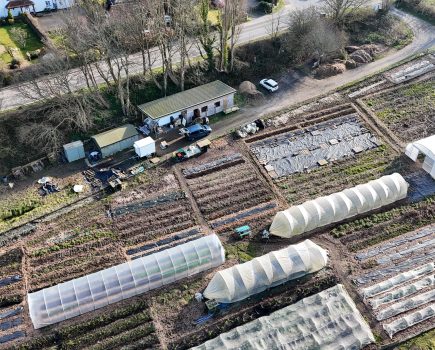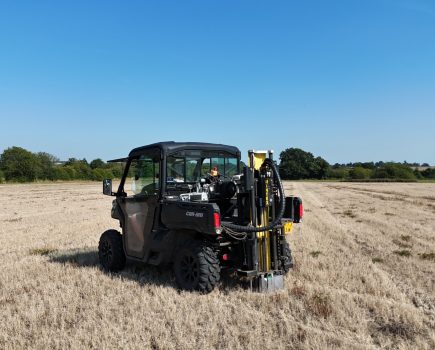CLM’s Matthew Berryman has a succinct way of summing up the challenges facing agriculture at the start of another new year.
“If you had asked someone ‘what is a farmer?’ 25 years ago, they would have thought you were mad,” he pointed out. “Now it’s not such a daft question. Are they a ‘save the planet’ rewilder, an energy producer, a food producer or something we haven’t even thought of yet?”
He could, of course, have added light industrial unit landlord, glamping site proprietor and a few more career options into the mix, such is the spread of occupations now encompassed by the planet’s longest-standing industry.
Helping farmers find the right mix of occupations and maximise the returns available from their holdings is where CLM, the Hartfield, East Sussex-based farming, environment, property and land consultancy, brings its own broad-based skill set into play.
Founded 20 years ago, CLM has evolved over the years into a sector-leading consultancy that is particularly well known for its groundbreaking work helping farmers and landowners benefit from the new raft of environmental schemes, including biodiversity net gain (BNG) which is set to kick in properly this January.
Evolution is a recurring theme in any conversation with the CLM team – both in their own approach to the opportunities and challenges facing farmers and in the firm’s continued growth.
“Farming has evolved, the part we play in it has evolved and I feel my own contribution to the firm has evolved with it over the past 20 years,” explained founder and managing director Mark Weaver. “The most important thing is that we have adapted our advice and our support in tandem with the changes in farming and in partnership with our clients.”
As Matthew Berryman added: “Change brings questions, and we are here to help answer those questions.”
Taking advice, though, means trusting the person offering it, and that’s another area where Matthew believes CLM’s focus on building long-term relationships with clients has paid dividends.
“I’ve worked with some farmers since 1997,” he explained. “Relationships with clients can take years to establish, and the important thing to remember is that farmers don’t use firms, they use people; people they trust.”
While the firm has evolved over the past two decades, it has also achieved a remarkable stability, with the core team established within the first three years still forming the bedrock of the consultancy.
The firm was launched in 2004 by Mark Weaver and the late Tim Calcutt as a partnership providing hands-on farm management services.
After leaving Wye College, Mark was working for Tim and his father-in-law Gordon Denniss at GK Denniss Farms in Withyham when the pair encouraged him to enrol on the Worshipful Company of Farmers’ Advanced Agricultural Business Management course.
Finishing the course inspired to launch his own business, Mark suggested that he could continue working for the farm as agent/consultant rather than as the employed estate manager. He spent Easter 2004 repainting the farm office, supported by his wife Tam, and putting up a CLM sign. Becca Scrace, who had been the farm secretary, became part-time assistant and CLM’s first employee.
Looking back, Mark believes Tim “saw something in me that I didn’t see in myself. He created the opportunity, along with Gordon, and I took it.”
He added: “I had no idea where CLM would go, and I think that if anyone had told me what the firm would look like in 20 years’ time I would never have believed them. It’s grown way beyond my dreams. I was fully embedded in the journey from the start, but I didn’t see quite how far we would travel.”
Mark’s own role has again evolved, from advising on arable and beef concerns and “a bit of stewardship” to working with larger estates on critical but less hands-on issues such as succession planning, taxation and protecting family assets.
CLM’s 20-strong, highly qualified team includes land agents, farm business advisers, planners, valuers, environmental specialists, agriculturalists, ecologists and property experts who work to boost the bottom lines of clients ranging from family farms and landed estates to property developers and international investors.
As the business found its feet, Mark and Tim were joined by Anthony Weston, an expert in the relatively new environmental schemes that were beginning to play an increasingly large part in farming decisions.
“Anthony was one of the first people we employed, and it was a good decision,” Mark recalled. Anthony moved to CLM from the Farming and Rural Conservation Agency to take on much of the increasingly complex stewardship applications and is today a recognised expert in BNG.
“Back in 2005 there was already a big appetite among farmers to think about agri-environment schemes in a commercial way and how they could be made to fit in with their farming businesses,” Anthony recalled. “When the Basic Payment Scheme first made subsidies available to many more farmers, people needed a huge amount of help to complete their applications.”
While he was brought in for his technical knowledge, Anthony recalled that the set up in the early days was still geared to hands-on farming. “Tim insisted that we always had to have a set of overalls in the back of the truck in case we had to pitch in and help with anything,” he recalled.
With the workload growing, it wasn’t long before Anthony “tapped on the shoulder of one of my old colleagues” and brought Kevin Jay into the fold.
Kevin was also skilled at getting the best out of agri-environment schemes and joined “to help with the huge raft of work that was landing on the desks as government policy pushed farmers towards taking more of an environmental focus.” He added: “That’s even more the case 20 years on.”
Increasingly, Kevin is working on matching developers who need to meet their BNG obligations with landowners who are able to add the required biodiversity on their land. In one recent case he was able to double a potential payment offered to a farmer by a house builder.
“It’s all very new and not a lot of people know what they are dealing with,” he said. We’ve even been guiding some solicitors on how it works as it only becomes law in January, although a number of planning authorities switched on to the idea earlier and have already been asking for it.”
While BNG, the Sustainable Farming Incentive (phase one of the Environmental Land Management scheme) and natural capital opportunities make an important contribution to CLM’s business, the firm offers far more.
Kevin also supports farmers with farm business tenancies (FBT) and contract farming agreements as well as arranging ecological surveys in support of planning applications. He is currently working on an ecological appraisal and survey work for an entirely new farmyard proposed for a site in East Sussex.
He has also been involved in an interesting project in Suffolk, where a client is putting in a large habitat compensation scheme to allow a hospital to be built. The farmer is moving from arable to grassland, and as part of the scheme turf containing wax cap mushrooms is being moved from the hospital site to the client site. Kevin is also organising the FBT and grazing licences that will be needed to create and maintain the wood pasture/parkland environment being created.
Alex Macdonald came aboard in 2011, having notched up over a decade’s experience working at Natural England and its predecessors, and Matthew Berryman, who joined in 2007 to strengthen the farm and estate management team, brought 20 years’ experience of providing management and business advice in Yorkshire, the Midlands, the Eastern Counties and the South East.
Matthew has also since found himself the main point of contact within CLM for viticulture, an increasingly important part of the South East’s ‘farming’ tapestry. “Vineyards are a small part of what we do, but it is nonetheless another service we offer,” he explained.
Matthew also supports farmers with diversification advice – “whether that’s turning a redundant dairy into a car storage facility or advising on renewable energy or glamping opportunities”.
With his business management hat on, Matthew is also gearing up for future challenges that could follow a change of government, something that many forecasters are predicting.
“If a Labour government comes into power and there are alterations to Inheritance Tax and Agricultural Property Relief and how that relates to things like contract farming agreements, that will be a game changer,” he pointed out. “There could be huge changes ahead and CLM will be ready to help people through that period.”
Looking even further ahead, Matthew believes that the pendulum that’s currently moving from food to flowers may well swing back again, although not for a few decades. “I suspect that, even if it doesn’t happen for 30 years or so, farmers will at some point be paid to bring land back into food production,” he said.
With the population continuing to rise, less land to grow it on and climate change putting some areas of land under water and making others too arid for crops, he believes the UK, which is “suitable for grain, grapes, beef, milk, sheep – the lot” will once again focus on food production.
“This is a fascinating sector to work in and CLM is a great team, a mix of experience and youthful enthusiasm,” he added. “I believe the buzz we have here is unrivalled – and that can only be good for our clients.”
But the last word should rightfully go to Mark Weaver: “We understand the issues that matter to clients – and what makes them tick – because we share their values. We know that farming well matters, that looking after the countryside with responsible environmental stewardship matters and that preserving and growing wealth matters.
“We know that, long-term, passing on assets is important but that in the short term cashflow is king. That family and business are often inseparable. That the battle to cut costs never ceases. That diversification brings the possibility of new income, as do natural capital and biodiversity net gain.
“So whether it’s securing planning permission, solving a succession conundrum, overseeing a land sale or reducing a tax bill – and many such issues are, of course, interconnected – farmers and landowners need advice that allows them to take the opportunities and navigate the challenges presented by this fast-changing world. And that’s what CLM provides.”







